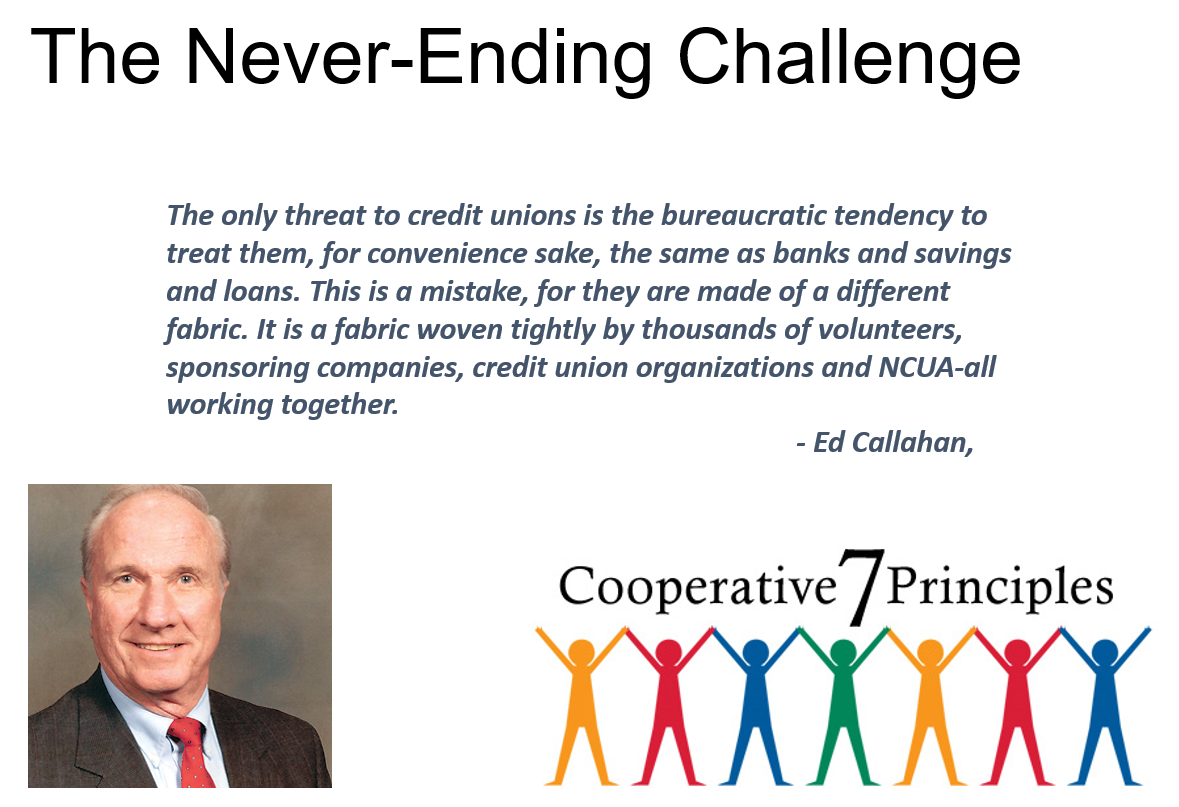The process took 23 months. The appeal required multiple in-person meetings. And oral hearings. The credit union engaged an attorney. The most senior regional and professional staff at NCUA opposed the petitioner’s request.
In the end, the board exercised common sense. It adjudicated the appeal in favor of the credit union. A difference that, on the record, should have been resolved at agency’s local level.
This event is the first time in a long, long while in which the NCUA board has acted as a true board. It overturned the actions and judgment of agency senior staff in their most important activity-examinations. This decision could be a critical turning point in board oversight and staff accountability.
This summary is prepared from the Order published by the agency.
Background Summary
On November 26, the NCUA released a Decision and Order on Appeal of a Region’s and Supervisory Review Committee’s CAMEL 3 examination rating of a credit union.
The Order provides dates for the many steps required in this elongated bureaucratic appeal process. The Order repeatedly presents the explanations for the Regional office’s downgrading of the examiner’s recommended CAMEL 2 rating to CAMEL 3, and the SRC’s concurrence.
The examination date was December 2019. The Board released its Order in late November 2021, or almost two years after the exam date.
Reading the agency’s repeated justifications for not correcting a flawed process reminds one of the old joke about NCUA examinations:
Question: What’s the difference between your NCUA examiner and a terrorist?
Answer: You can negotiate with a terrorist!
The Board’s Finding and Conclusion on the Credit Union’s Appeal
The Finding by the Board
After a de novo review of the administrative record, and taking both parties’ oral presentations under advisement, the Board finds, by a two to one vote, that the Region erred in assigning Petitioner a composite CAMEL 3 rating, effective December 31, 2019.
The Board notes the record in this case reflects several documented errors on the part of the Region, including miscommunications and breaches of NCUA examination procedures. Notably, the credit union was given an exam report containing composite CAMEL 2 language to support a composite CAMEL 3 rating. In addition, the exam report included DORs that did not cite a specific regulation, in violation of agency policy and regulation.25 Accordingly, the Board considers those DORs26 invalid and they are accorded no weight in this appeal.
Looking purely at the numbers, Petitioner’s ratios appear to be better than, or in line with, the average lowest rated composite CAMEL 2 credit unions:
The Board disagrees with the Region’s Asset Quality rating. The solid performance of Petitioner’s loan portfolio infers that the Region’s rating was based on the quality of the borrowers, rather than the quality of the loans. For example, although the borrowers’ average FICO scores were in the low 600s, delinquencies are very low. The Board notes it is much easier to achieve low delinquencies with borrowers with higher (e.g., 750 – 800) FICO scores.
Further, while the Board is not prepared to overturn the Region’s Capital rating, the Board is concerned that the Region failed to articulate to Petitioner why this credit union’s risk profile demands such high capital levels, especially when capital adequacy is defined by the Federal Credit Union Act (FCU Act).27 Petitioner’s net worth position of XXXX percent is considered well capitalized under prompt corrective action.28 The Board notes XXXX Petitioner’s net worth was still stronger than statutorily required by the FCU Act.
Additionally, the Board disagrees with the Region’s Management rating. XXXX Management understands how best to work with the credit union’s members XXXX.
Conclusion
The Board finds nothing in the record to support this credit union is “less capable of withstanding business fluctuations and [is] more vulnerable to outside influences.”29 Based on the Board’s full and independent review on appeal, the Board finds the Petitioner’s composite CAMEL 3 rating is not justified. Instead, a composite CAMEL 2 rating is appropriate.
Why This Example Is Extremely Important
The agency process for this extended appeal lacked any semblance of mutual objectivity. Following are the timelines of the exam and appeal process presented in the Order:
Examination data used: December 31, 2019
Exam began: February 29, 2020
Report released by Region: June 25, 2020 (six months after the exam date)
Credit Union Board met with Regional staff: July 14 2020
Credit union filed request for reconsideration: August 13, 2020
Region reaffirmed the CAMEL 3: September 11, 2020
Credit union letter to appeal Region’s Decision to the SRC: October 8, 2020
Appeal letter opened by SRC 42 days later: November 19, 2020
SRC held oral hearing with credit union: February 2, 2021
SRC affirmed the Region’s CAMEL 3: March 2, 2021
Credit union filed supplemental appeal letter to NCUA: April 14, 2021
Credit union requested an administrative review by NCUA board: granted April 20,2021
NCUA Board oral hearing with credit union: June 10, 2021
Order issued assigning a CAMEL 2: September 8th, 2021 (last modified date of November 22, 2021)
For any credit union to persevere during this nearly 23 month gauntlet of appeals and hearings in the face of bureaucratic intransigence is a demonstration of true grit and determination—even courage.
The fact that the Board was willing to listen to the appeal and then reverse the agency’s repeated justifications of its actions, is a noteworthy and critical exercise of Board oversight. For the Board directly challenged and changed the Region’s and SCR reasons for assigning specific CAMEL ratings.
Why was the credit union so persistent? Especially as the standard for appeal to the board is difficult: “the burden of showing an error in a material supervisory determination rests solely with the insured credit union.11”
This criteria means the credit union must show that the agency made a mistake. Such a finding is contrary to every regulatory impulse that the regional office’s judgments and findings can be incorrect. It shatters the aura of expertise that is the core of a regulator’s authority.
What the Supervisory and District Examiners Told the Credit Union
The following is from the oral recordings and written transcripts of what the Supervisor and District Examiners told the credit union in assigning a CAMEL 2 rating upon completing the exam:
The Composite CAMEL rating is based on our assessment that you are fundamentally sound. For a credit union to receive this rating, generally no component rating should be more severe than a 3. Only moderate weaknesses are present and are well within the board of directors’ and management’s capabilities and willingness to correct.
While this rating results in an upgrade, as you do not pose material concerns, we have retained a management rating of “3.” This rating indicates some degree of supervisory concern. You will not qualify for an extended exam program and will remain on a 12-month examination supervision schedule.
Bureaucratic Jargon Overrides: “Authorized and Unauthorized Examination Versions”
NCUA Regional staff explained this overruling of the district and supervisory examiner’s CAMEL 2 rating by saying it was an “unauthorized version, erroneously issued.”
The Region’s “authorized exam version” explanation is that upon its review, “the Region found that staff had mistakenly excluded from the examination report closing language that had been approved for release. Noting that the reconsideration determination should be considered an addendum to the examination report, the Region’s September 11 letter indicated that the final paragraph in the Examination Overview that discussed Petitioner’s composite CAMEL 3 rating should have read: The Composite CAMEL rating is 3”
“Arbitrary and Capricious”
This overturning of the field examiners’ judgment was the core of the credit union’s appeal.
Petitioner further contends that the Region’s field examiners followed NCUA’s published examination procedure by including their first-hand observations and on-site assessments of the credit union into a draft examination report that concluded a composite CAMEL 2 rating was appropriate, but that same draft examination report was subsequently altered after field staff was “overruled,” to reflect the final composite CAMEL 3 rating that was issued to the credit union. Petitioner argues that “the same set of facts resulting in two different and inconsistent conclusions is by definition arbitrary and capricious and fundamentally lacks a rational and reasoned connection to the evidence.”
A Credit Union to Be Saluted
We do not know who the credit union is. It takes a special kind of leadership to challenge regulatory authority when a credit union has been wronged. The process takes time, resources and distracts from the primary job of serving members. The emotional toll can be telling as well.
Every credit union knows the examiners will be back in another 12 months and the agency is always tempted to prove they were right. The fact that the board was willing to take this appeal and support the credit union’s position is an important check and balance that has been long absent in NCUA examination and supervisory actions.
A Worrisome Dissent
The dissent by chairman Harper presents interesting logic. He writes: “Although the process by which the credit union received its report and rating was inconsistent and flawed,31 an inconsistent and flawed process can still produce a reasonable and supportable result.”
An NCUA chairman seeing an “inconsistent and flawed process” should have set off alarm bells about the agency’s entire examination effort, not to mention the internal review process.
Moreover, if the means to an end are found deficient, how does one justify the end result or, in this case CAMEL assignment? That is the arbitrary moment that many credit unions have experienced in examinations.
For data and logic are the way sound judgments are supported. This is a critical skill for examiner effectiveness in their credit union dialogues. It should be modeled at the highest levels in the Agency, not asserted using one’s position of presumed authority.
Following are two additional references from the Order presenting the distinction between regulations and guidance, which were used by Board:
25 NCUA’s regulations, Part 791, Subpart B, reiterates the distinctions between regulations and guidance and prohibits examiners from criticizing (through the issuance of DORs and supervisory recommendations) a supervised credit union for a “violation” of, or “non-compliance” with, supervisory guidance. The NCUA’s National Supervision Policy Manual requires examiners to cite to the specific section of the Federal Credit Union Act, NCUA regulations, Federal Credit Union Bylaws, or other authority and (if the credit union violates more than one) to cite the highest authority.
26 Of the DORs included in Petitioner’s exam report, 2 of 5 DORs included specific regulatory citations, while 3 of 5 included only general or incomplete citations.







